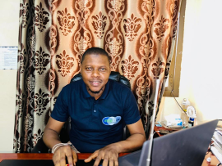By patricia.ngevao@awokonewspaper.sl
In Rise Radio’s newsroom in Brookfields, Freetown, a young journalist sits at her desk, surrounded by stacks of papers, a buzzing computer screen, and the faint hum of a busy newsroom. The tapping of keyboards fills the air as the community’s pulse echoes through the building. But for this particular journalist, Fatmata Bangura, there’s an uncertainty about a topic that has never made its way into her daily reporting routine: transitional justice.
“I’ve been covering parliament, social issues, and the occasional stories, but transitional justice? It’s not something I’ve really thought about,” she says, her voice barely rising above the hum of the newsroom. Fatmata, in her twenties, is a reflection of many in the Sierra Leonean media landscape: a reporter who has grown up in the shadow of the country’s brutal civil war but has never truly engaged with the complex mechanisms of post-conflict justice.
Her experience, or lack thereof, with transitional justice is not unique. For many journalists in Sierra Leone, concepts like the Truth and Reconciliation Commission (TRC) and the Special Court for Sierra Leone (SCSL) remain distant, foreign entities – important, yet almost inaccessible.
Transitional justice, with its focus on addressing past atrocities, achieving accountability, and fostering national healing, is inherently complex. For a young journalist like Fatmata, the topics of war crimes, human rights violations, and the processes through which Sierra Leone sought justice after its devastating decade-long civil war, can feel daunting. “I know about the TRC from school, but I don’t really understand how it works, or what it means for the people who were affected by the war,” she confesses.
Such sentiments are not uncommon. Even as the country has made significant strides toward peace, many journalists remain ill-equipped to cover the intricate subject of transitional justice. This lack of knowledge stems not only from the absence of formal training on these issues but also from the difficulty of engaging with them in a media environment where sensational stories often take precedence over nuanced reporting.
For Fatmata, the idea of covering stories about victims and perpetrators, about trials that may last years, or about the intersection of legal and human rights concerns, is an overwhelming prospect. “It feels like a topic for experts,” she says, clearly struggling with the challenge of covering an issue that seems to demand far more depth than her regular beats.
This admission was not unusual. Many journalists in Sierra Leone have little exposure to transitional justice beyond passing mentions in history books. Despite the country’s brutal civil war and the subsequent efforts to establish justice and reconciliation, media coverage on the topic remains limited. The question arises: How well has the media covered transitional justice? What challenges have journalists faced? And what impact has their reporting had on national healing?
For others, unfamiliar with transitional justice, the lack of coverage stems from multiple factors. Some reporters lack training and resources to engage with post-conflict justice issues. Others fear political backlash, while some feel that the topic is too complex for mainstream media coverage.
The media’s role in covering transitional justice is not simply about telling the story, it’s about telling it with empathy, fairness, and a commitment to truth. Yet, for many, this role is not without its dangers.
In the early years following the war, some journalists found themselves facing censorship, intimidation, and even threats from powerful figures who sought to suppress the truth. “There were times when the government didn’t want certain details to be published, or when they told journalists to tone down their coverage,” recalls Mitchel Sesay, a longstanding figure in the media environment, although he is not a journalist himself. He has been working in the media environment since the early 90s, supporting various media houses. Mitchel is also known for being a close friend of Winston Ojukutu Macauley, a veteran journalist who was subjected to torture for his courageous reporting on the war before the ECOMOG intervention.
Noteworthy, Mitchel recalled how investigative journalism played a crucial role in exposing war crimes and human rights violations. He said “Media coverage helped keep the public informed about court proceedings and shaped national conversations about justice. But they also faced censorship and intimidation from powerful figures who didn’t want the truth to come out.” Despite these pressures, media coverage contributed to a broader understanding of justice and reconciliation, helping Sierra Leoneans engage with the post-war legal process.
A journalist, Mariatu Tamba from Salone Times Newspaper, shared, “The lack of coverage on transitional justice in Sierra Leone can be attributed to a combination of insufficient training, limited resources, and a general fear of political backlash. Many reporters feel the topic is too complex for mainstream media, which makes it a difficult subject to address.”
In contrast, a journalist from AYV, Ronald Joe Monrovia, who covered issues related to transitional justice. He shared, “It was difficult. There was political pressure, and sometimes victims were afraid to speak out. We had to ensure our reporting was accurate and sensitive to their trauma.”
Civil society organizations (CSOs) have played a crucial role in bridging the gap between the media and the public on transitional justice by collaborating with journalists to provide training on human rights and post-war justice reporting.
Augustine James, head of programs for the Media Reform Coordinating Group (MRCG), emphasized the media’s critical role in informing the public about unresolved issues highlighted in the Truth and Reconciliation Commission (TRC) reports to prevent a return to conflict.

Augustine James, head of programs, Media Reform Coordinating Group (MRCG),
“With support from the African Transitional Justice Legacy Fund (ATJLF), the MRCG has trained hundreds of journalists since 2020, offering mentorship programs and publishing transitional justice-focused content both locally and internationally,” James said.
While some journalists have excelled in their reporting, Lolo Yeama Sarah Thompson Oguamah, Executive Director at Initiative for Media Development (IMDev) highlighted challenges such as limited resources, editorial restrictions, and the tendency for sensationalism to overshadow survivors’ stories.
“The media must prioritize ethical storytelling, focusing on the dignity and voices of survivors, rather than exploiting their pain for sensational headlines,” she said.
Despite additional obstacles, including unresponsive government officials and difficulties in accessing reliable sources, James encouraged journalists to remain committed, emphasizing that strong media engagement in transitional justice is essential for national healing and accountability in Sierra Leone.
From the government’s perspective, the Director of Information at the Ministry of Information and Civic Education, Emmanuel Turay pointed out that the media played a dual role, both as an ally in public education and, at times, as a source of tension. However, he noted that better collaboration between the media, government, and CSOs, are essential to ensuring that justice mechanisms remain transparent and accessible to all.
Looking ahead, the role of the media in Sierra Leone’s transitional justice journey remains critical. While the media has made significant strides in covering post-conflict issues, there is still much work to be done to strengthen their role in peacebuilding. Greater investment in journalist training, particularly on transitional justice and human rights, is needed to equip reporters with the tools they need to navigate these sensitive topics.
Moreover, there is a need for stronger legal protections for journalists to ensure that they can continue their work without fear of reprisal. Increased collaboration between the media, government, and CSOs will also help build trust and ensure that the public receives accurate, balanced information about justice and reconciliation efforts.
This story is brought to you with support from the Africa Transitional Justice Legacy Fund (ATJLF) through the Media Reform Coordinating Group (MRCG), under the project ‘Engaging Media and Communities to Change the Narrative on Transitional Justice Issues in Sierra Leone.’

